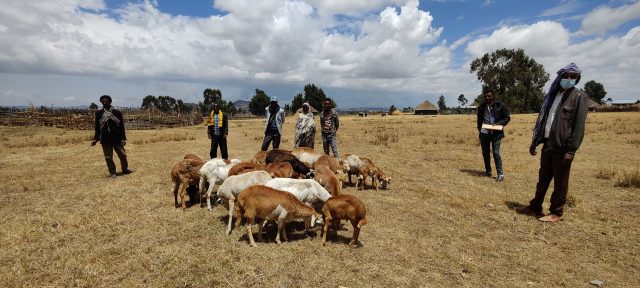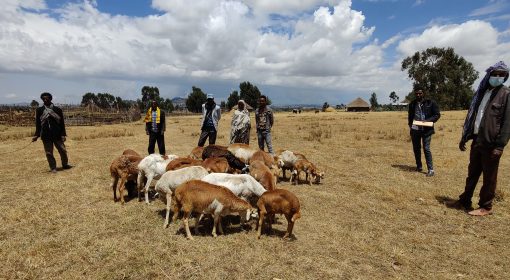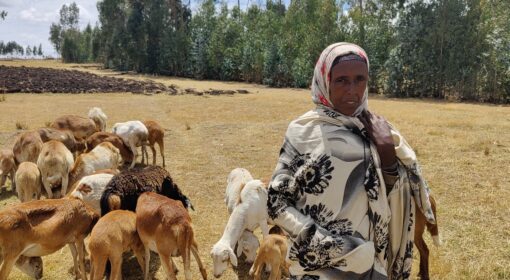11 challenges (and opportunities!) on the road toward a strong and diverse rural economy in Rural Ethiopia
By Nardos Masresha
Small and Micro Enterprises (SMEs) play a crucial role in the rural economy of Ethiopia as they provide employment opportunities to many Ethiopians living in the countryside. Strong up-and-running SMEs are essential in providing jobs for the many unemployed youths. Moreover, SMEs can supply the required input for regenerative agriculture, such as biofertilizers.
What are Small and Micro Enterprises?
These enterprises are classified based on their size, with Micro Enterprises having a maximum of 5 members and Small Enterprises having 6-30 members. SMEs are present in various sectors such as construction, agriculture, manufacturing, and services.
The Ethiopian government in collaboration with NGOs is implementing policies and programs that support the growth and development of SMEs. Despite these efforts, the process of creating a strong rural economy in Ethiopia has faced several challenges. This blog explores the opportunities and challenges faced by SMEs in Ethiopia and discusses the measures taken to promote their growth and development. There is momentum right now to strengthen and diversify the rural economy of Ethiopia: the government is being more and more supportive towards the growth and development of SMEs, the country has an enormous domestic market with a growing middle class, and there is also a significant amount of funding opportunities. Yet, there are still many challenges (and solutions to address them), all listed below:

11 challenges and opportunities in setting up a strong and diverse rural economy in Ethiopia.
- Organizational challenges – In any SME program, identifying the most suitable candidates to guide in setting up a business is crucial. When this process is rushed, and the importance of group dynamics is overlooked the SMEs are bound to fail. Building cohesion and synergy among SME group members also takes some time to develop. It is important to scout individuals that are motivated and ready to learn and take on the challenge, moreover, they should be motivated to help create opportunities for others. Selecting prospects for such programs that are only driven by short-term and simplistic motives should also be avoided.
- Inadequate legal and regulatory framework – SMEs are confronted with legal and regulatory obstacles, such as high taxes and complicated registration procedures. To address these challenges the registration process for new businesses should be simplified, and regulatory barriers should be removed.
- Lack of network and resources– Many people living in rural Ethiopia lack access to resources and a solid network to learn from and acquire the expertise to succeed in setting up a business. To address these challenges, networks should be made (for example through horizontal learning and promoting collaboration between SMEs). By working together, entrepreneurs can pool their resources, share knowledge and experiences, and create a stronger presence in the market.
- Lack of finance resources – Many SMEs face limited access to finance due to several factors. First, many SMEs operate in the informal sector and do not have formal financial records, making it difficult for them to access bank loans or other forms of formal financing. Second, banks and other financial institutions in Ethiopia often consider SMEs to be high-risk borrowers due to their limited financial track record and lack of collateral. The government has several initiatives to support SMEs’ access to finance. However, the application process for these loans can be time-consuming and complicated. To address these challenges, kick-start funding or micro-loans should be enabled (for example through a revolving fund). Also, promoting the use of formal financial services such as digital banking and mobile money can help SME members track their finances more effectively and reduce their reliance on informal financial practices. Moreover, the government and financial institutions should collaborate to create financing solutions tailored to meet the specific needs of SMEs and, through this, play a vital role in the country’s economic growth.
- Lack of experience and knowledge – For many people who want to set up an SME an obstacle is the lack of experience and knowledge on how to do it. This results in poor decision-making and management practices. They often lack the essential skills and knowledge to handle finances, market their products, and negotiate with suppliers and customers. Especially in rural areas, people face restricted access to educational opportunities and training. Basic business skill training in financial management, marketing, and accounting, and support should thus be given to help young entrepreneurs and SME members develop the skills and knowledge needed to succeed.
- Fear of failure and resistance to change – Starting a business is a risky endeavor, and many are unwilling to take risks due to a fear of failure. This leads to reluctance to innovate or experiment with new strategies that could result in growth and success. These challenges could, again, be addressed by providing sufficient training and mentorship to overcome fear and resistance and increase confidence in setting up a business. In addition, a culture of entrepreneurship and innovation should be promoted. This can involve providing funding and other incentives for innovative business ideas, as well as highlighting success stories and role models in the entrepreneurial community.
- Dependency syndrome – Many SMEs develop a dependency syndrome, where they expect the government and NGOs to solve any challenge they face. This highlights the importance of capacity building and providing good training to ensure that SMEs are well-equipped to face these challenges.
- Lack of patience – Many SMEs may expect quick results and success, which leads to a focus on short-term gains rather than long-term growth. This can result in a lack of investment in business infrastructure, product development, and market research, which hinder the growth and competitiveness of the business. To address this challenge, members of SMEs should be educated on the importance of patience and long-term planning. Business development services can provide training on strategic planning, market research, and product development, helping members to understand the importance of investing in their businesses for long-term success.
- Group work challenges – SME members frequently encounter obstacles when collaborating as a team. These obstacles can include power struggles that arise from ambiguity around roles and responsibilities or when individual members prioritize their interests over the group’s objectives. This can result in conflicts that diminish the group’s unity and productivity. Another challenge is the lack of trust, which is crucial for successful teamwork. SME members may have trust issues due to their diverse backgrounds or past negative encounters. It is important to promote effective communication and collaboration among group members to address these challenges. This involves developing clear communication channels and establishing norms for how group members communicate and work together. In addition, it is important to establish clear roles and responsibilities for each member of the group, as well as guidelines for decision-making and conflict resolution. This can help minimize power struggles and ensure that each member’s contributions are valued and recognized. Moreover, building trust among group members is essential for effective teamwork. This can involve team-building activities and exercises that help members get to know each other better and develop trust and respect. Also, as mentioned above, the group dynamics should already be considered from the start during selecting SME members.
- Social challenges – SMEs in Ethiopia also face social challenges that can hinder their formation and growth. These difficulties encompass cultural barriers, gender inequality, scarcity of role models, and a negative perception of failure. Cultural differences across Ethiopia’s diverse communities may make it challenging for young entrepreneurs to commence and operate a business. In some cultures, entrepreneurship may not be considered a viable career path, leading to discouragement among youths. Women in Ethiopia face significant hurdles in starting and growing their businesses, including limited access to education, financial resources, and networking opportunities. Additionally, the scarcity of role models and mentors hinders young entrepreneurs’ ability to navigate the complexities of starting and managing a business. Finally, failure is stigmatized in Ethiopian culture, discouraging aspiring entrepreneurs from taking risks and trying new ideas. To address these social challenges, there needs to be a cultural shift toward promoting entrepreneurship as a viable career path, particularly for women and young people. This can involve creating awareness campaigns, providing mentorship and role models, and addressing cultural and social barriers that discourage young entrepreneurs from pursuing their dreams. Additionally, addressing the stigma against failure requires a shift in mindset towards accepting failure as a natural part of the entrepreneurial process. This can involve promoting a culture of learning from failure and providing support and resources to young entrepreneurs who experience setbacks.
- Infrastructure challenges – In, particularly rural, areas with poor infrastructure and a weak or non-existent transportation system, it is challenging for entrepreneurs to access the resources and markets necessary for sustaining their businesses. The good news is that there is huge potential for establishing a strong infrastructure in Ethiopia as many people are eager to jump into this market gap and create a business in this sector[1]. See also chapter 10 of this blog bundle.
To conclude, this blog showed that with the right strategies and support, SMEs can play a significant role in enhancing members’ livelihoods and the economic development of Ethiopia. Despite the challenges faced by SMEs, there are opportunities for SMEs to grow and expand their operations. In collaboration with nongovernmental organizations, the government has launched various programs and initiatives to support the growth of SMEs. SMEs can tap into the domestic and regional markets to grow their businesses.
[1] https://thewaterchannel.tv/thewaterblog/rural-transportation-in-ethiopia-status-quo-and-ways-forward/



